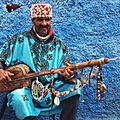Music of Morocco facts for kids
Moroccan music is a vibrant mix of sounds! It's very different from one part of Morocco to another, and also changes depending on the group of people playing it. This music has been shaped by many cultures, including Amazigh, Andalusi, Arab, Mediterranean, Saharan, and West African styles.
Moroccan music is like a journey across the country. Each region has its own special sound.
Contents
Musical Styles by Region
Morocco's music changes as you travel across its different areas.
Northern Cities' Sounds
In the big cities of northern Morocco, you'll often hear Andalusi music and malhun. These styles have a long history and are often played in formal settings.
Coastal Rhythms
Along Morocco's Atlantic coast, chaabi and aita music are very popular. Chaabi means "popular" in Arabic, and it's often heard at parties and celebrations. Aita is a traditional form of sung poetry.
Eastern Beats
In the Beni-Znassen region, which includes cities like Oujda and Berkane, you'll find reggada music. This style often features lively dance rhythms.
Gnawa Music
Gnawa music is well-known in cities like Essaouira and Marrakesh. It's a spiritual music with deep roots in West African traditions. It often uses a special instrument called a guembri and large metal castanets called qraqeb.
Atlas Mountain Melodies
In the Middle Atlas mountains, ahidus is a traditional Amazigh dance and song style. In the Sous region, you'll find ahwash, another type of Amazigh group performance that combines singing, dancing, and drumming.
Saharan Tunes
Deep in the Sahara Desert, guedra music is played. This style is often part of a special dance performed by women.
Modern Influences
Since the 1900s, Moroccan musicians have started mixing their traditional sounds with music from all over the world. You can now hear influences from blues, rock, metal, reggae, and rap in Moroccan music. This has led to many new and exciting musical styles.
Each type of Moroccan music has its own smaller groups and can be either 'modern' or 'traditional'. This means there's always something new and interesting to discover!
Images for kids
-
A gnawa street performer wearing traditional gnawi clothing in Rabat's Qasbat al-Widaya.
See also
 In Spanish: Música de Marruecos para niños
In Spanish: Música de Marruecos para niños
 | Emma Amos |
 | Edward Mitchell Bannister |
 | Larry D. Alexander |
 | Ernie Barnes |




